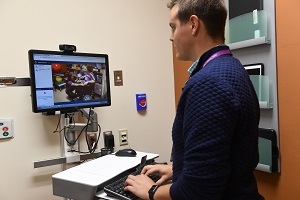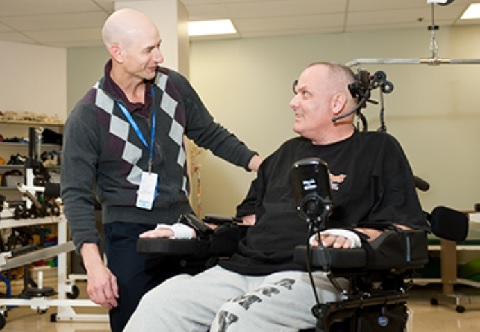Rehabilitation and Prosthetic Services
Physical Medicine & Rehabilitation Services (PM&RS) - Occupational Therapy (OT)
Occupational Therapy (OT)

The core purpose of Occupational Therapy practice is the therapeutic use of everyday life activities (occupations) with individuals, groups, communities, and populations to optimize independence, quality of life, and participation in valued life roles. Occupational Therapy services are provided by occupational therapy practitioners which include occupational therapists (OTs) and certified occupational therapy assistants (COTAs). VA occupational therapists are licensed independent practitioners who are experts across varied practice settings in habilitation, rehabilitation, and health promotion and disease prevention through the application of their unique clinical lens and use of evidence-based interventions. They concurrently and comprehensively assess and treat physical, cognitive, psychosocial, and environmental factors impacting Veterans’ functional performance.
- OT fact sheet (PDF).
- OT Mental Health fact sheet (PDF)
Occupational therapy helps Veterans reach their full potential through doing, being, becoming, and belonging.
VA Occupational Therapy - Site Navigation
- Career VA Occupational Therapist (OT)
- VA Fellowship Programs (OT)
- Occupational Therapy Month
- Advance your skills with Occupational Therapy Fellowships
- How Occupational Therapy Works for You
- VHA Directive 1170.06(1), Occupational Therapy Services
Occupational Therapists (OTs) and Certified Occupational Therapy Assistants (COTAs)
Veterans Health Administration (VHA) Occupational Therapists (OTs) and Certified Occupational Therapy Assistants (COTAs) provide state-of-the-art and evidence-based care to Veterans and servicemembers. Occupational Therapy provides services that promote health and wellness to Veterans who have, or are at risk for developing, an injury, illness, disease or condition spanning physical, cognitive, sensory, and psychosocial domains. Occupational Therapy evaluation and treatment supports Veterans' engagement in everyday life activities that affect their physical, and mental health and well-being. Occupational therapy services are provided at:
- Outpatient clinics
- Inpatient settings
- Community Living Centers
- Veterans' homes and communities
- Tele-rehabilitation
Occupational Therapy Specializations:
Occupational Therapy covers a broad spectrum of neurological, orthopedic, medical, pre/post-surgical, and mental (behavioral) health conditions, as well as health promotion, wellness, and management of chronic conditions. Occupational Therapy specializations include:
- Return to Independent Living in the Home and Community after illness or injury
- Return to School and Work
- Mental Health Promotion, Prevention, and Intervention
- Home Safety and Accessibility
- Productive Aging and Aging in Place
- Independent living to reduce risk of homelessness
- Disaster Preparedness and Risk Reduction
- Driving and Community Mobility
- Vision Rehabilitation
- Falls Prevention
- Assistive Technology
- Wheelchair Seating and Mobility
- Ergonomics
- Health and Wellness
- Cognitive Rehabilitation
- Pain Management
- Women's Health
- Lymphedema Management
- Hand Therapy
Occupational Therapy Key Highlights 
- VHA is the single largest employer of occupational therapists, employing more than 2,000 occupational therapists and certified occupational therapy assistants.
- Occupational Therapy practitioners provide Veteran-centric, state-of-the-art and evidence-based care (including telehealth) to over 500 VA sites.
- OT provides value-based and unique services; no other discipline holistically measures functional, physical, and cognitive skills through occupations.
- “Occupational therapy is the only spending category where additional spending has a statistically significant association with lower readmission rates” for the three health conditions studied: heart failure, pneumonia, and acute myocardial infarction. (AOTA, 2016) doi.org/10.1177/1077558716666981 Source: Rogers, A. T., Bai, G., Lavin, R. A., & Anderson, G. F. (2016, September 2).
Points of Contact
- VA Central Office Rehabilitation and Prosthetic Services Occupational Therapy Point of Contact: Frederica O'Donnell, OTD, OTR/L
- VHA OT Field Advisory Council Chair: Lindsay Marth, MA, OTR/L, BCPR, BCB
Additional Resources
- American Occupational Therapy Association*
- National Board for Certification in Occupational Therapy*
See if an OT career at VA is right for you.
- SEARCH for open OT careers and apply for a position near you.
- READ about working at VA as an OT.
- WATCH this video to hear from one of our OTs.
- EXPLORE the top 10 reasons to work at VA.
- VISIT www.vacareers.va.gov for more information.
OTs/COTAs are always needed at VA
Whether you’re a new graduate or an experienced professional, OTs/COTAs are always needed at VA. Whatever opportunity you’re looking to explore as a OT, we have a way to get you exactly where you want to go, both professionally and personally
- EXPLORE our mission to serve Veterans.
- READ about benefits of joining our team.
- APPLY for jobs at VA.
Find VA locations near you with our facility locator tool: https://www.va.gov/find-locations/
Can’t find what you’re looking for? Try using our other tools to search. https://www.va.gov/directory/guide/home.asp
*Link will take you outside of the Dept of Veterans Affairs (VA) Website. VA does not endorse and is not responsible for the content of the linked websites. The link will open in a new window for the content of the linked websites.



















